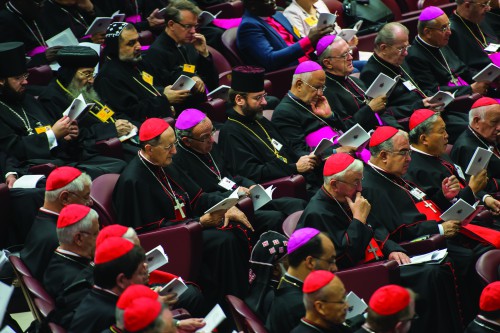Synod addresses unconventional Catholic families
GWYNETH SHOECRAFT
NEWS EDITOR
@gshoecraft
In Vatican City, 200 Catholic bishops are currently meeting in a two-week closed-door synod, or assembly, called together by Pope Francis to discuss family issues facing the Roman Catholic Church.
On Monday, Oct. 13, bishops, priests and other Catholics gathered together to hear a reading of a preliminary document crafted by the pope’s hand-picked committee. The document spoke to the experience of unconventional families, and looked to how the church could better serve its members. In the reading, the committee specifically addressed cohabitating unwed couples, divorced Catholics and homosexuals.
The document does not purport to change official church doctrine or teachings. However, its release has still garnered media attention, calling the document a change in tone for the church.
Many University of San Diego professors and faculty believed the media is reporting on the assembly without fully understanding its implications for the Catholic Church.
Peter Marlow, associate vice president of University of San Diego communications, said the document simply discusses how to maintain the traditional teachings of the church in a practical way.
“This has nothing to do with a debate on doctrinal issues of the Catholic Church, despite what you might read in popular media outlets,” Marlow said. “The dialogue is about how best to bring people to a deeper appreciation of the church’s teachings on marriage and family. It is pastoral in nature.”
Pastoral discussions are primarily concerned with spiritual guidance, while doctrines are traditions concerned with the set of beliefs a church has and teaches.
Michael Lovette-Colyer, assistant vice president and director of University Ministry, believes the synod and Francis are placing a clear emphasis on mercy and acceptance within the church through new considerations.
“[T]here seems to be a novel commitment to reconsidering how the institutional church can do a better job of living its teaching on this topic while also upholding its traditional understanding of human sexuality more generally,” Lovette-Colyer said.
However, he notes that this discussion is not a change in the policies of the Catholic Church.
“Officially, the church already and fully welcomes those who are gay,” Lovette-Colyer said. “All people, regardless of sexual orientation and every other demographic quality, have infinite dignity and worth. That message, however, hasn’t consistently been heard or seen in people’s lived experience, especially among those who are gay.”
Despite the lack of any change to traditional doctrines, Emily Reimer-Barry, Ph.D, a professor in the department of theology and religious studies, says the document is still a positive step for the Church.
“I’m very excited about this news from Rome,” Reimer-Barry said. “The bishops remind the Catholic faithful that to follow Jesus means to preach the mercy and love of God, no matter what, without exceptions. To speak words of welcome to gay and lesbian Catholics is a step in the right direction.”
A lifelong Catholic, Reimer-Barry said the document, though still preliminary, is bolstered by its citation of scripture, the Second Vatican Council and other papal documents.
Reimer-Barry believes the document focuses on concern for the vulnerable in a new and exciting way.
“In other words, the bishops of the synod are making a special effort to draw on the tradition as they chart a way forward that is both traditional and new at the same time,” Reimer-Barry said.
Sophomore Jessica Noe believes that because the document was written by more than one Catholic official it holds importance to the entire community.
“For me to see that it came from a group from the Catholic Church, high ranking officials, and not just from the pope, shows solidarity with the group,” Noe said.
Yet Noe admits that she has already encountered some disagreements to the document within the media.
“There has been some quotes that I’ve read from other bishops who aren’t in favor of the movement,” Noe said. “But I think its interesting that it was a group that did this. What they were talking about, homosexuality and divorces, that’s a big jump for the Catholic Church. It’s very different.”
Many bishops have responded to the document’s reading with objections and debate. In an interview with Italian newspaper Il Foglio, American Cardinal Raymond Leo Burke revealed that many bishops are not as open to the document as the media would have those outside of the Vatican believe.
“A large number of bishops do not accept the ideas of openness, but few know that,” Burke said.
According to The New York Times, the document will continue to be discussed and modified over the remaining week of the synod. After that, a final report will be issued and disseminated worldwide in the upcoming year.
Though bishops’ objections of the document will inevitably influence its final form, The New York Times noted that it will be Francis who will ultimately determine the course that the report takes.
Sophomore Alana Hollenbough has followed the developments closely and says this document is not yet finalized.
“Before any decisions are made that would impact doctrine or the practices of the church, there will be months of discussion from every point of view and a great deal of time spent in discernment and prayer,” Hollenbough said. “The cardinals are trying to help the church be the home that it is intended to be for all people, but they will not compromise the values or teachings of the church in order to do so.”
However, she felt that the document is not a major change for many Catholics.
“We are called as a people to act out of love toward our brothers and sisters, no matter what their lifestyle is, or what choices they make, and that will not change,” Hollenbough said.
Despite developing major world news reports, numerous inquiries to USD students on campus brought about different opinions and awareness of the issue. Despite USD being a Catholic university, the synod does not seem to be a pressing development for most students.
